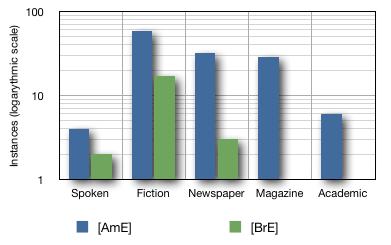Is "dawdle" a common verb in American English? In my limited experience I have never heard Americans use it.
-
Australians use it quite often.– Glen WheelerCommented Apr 12, 2011 at 8:13
-
1I use it every day. (Er, I mean I dawdle every day -- I'm doing it right now, in fact.) (It's definitely well-known and used with reasonable frequency in the US. Just not the type of word that would come up in formal language, in the news, etc. But well known to parents.)– Hot LicksCommented Dec 8, 2014 at 22:18
4 Answers
Looking on the Corpus of Contemporary American English for dawdle, and comparing the result with what reported by the British National Corpus, I would say that the word is not so common in American English, but it is used more in American English than in British English.

-
@kiamlaluno - I don't quite understand what it means "not so common, but is used more" - to me it sounds self-contradictory. Can you, please, explain. Commented Apr 12, 2011 at 11:49
-
3@brillant It is not self-contradictory. A word that is used in 59 sentence in fiction contexts, and it is used 29 times in newspapers, it is not what I would call a common word. The same word, however, is less frequently used in British English; that means it is more common in American English than in British English. I don't see any contradiction. Commented Apr 12, 2011 at 11:57
-
1I'm surprised by these results. "Dawdle" is an informal word. Seeing so few spoken instances relative to the newspaper and magazine columns seems odd.– user1579Commented Apr 12, 2011 at 13:29
-
1@Rhodri You should then be surprised to see the word used in academic context, even if in that case there are just six sentences. Commented Apr 12, 2011 at 13:40
-
Actually, neither the NOAD nor the OED reports dawdle is informal. Commented Apr 12, 2011 at 13:42
From an AmE speaker, this is perfectly fine. It's not a particularly common or newspaper-y word. It is most commonly used (and often) in the context:
Quit dawdling and tie you shoes or you'll be late for school.
It's almost never used in formal situations. It's the kind of language you'd use when talking to a family member or a friend, but not when talking to a professor or a coworker. I'd say it's common enough that even people who don't use it themselves will know what it means if someone says it to them.
-
1I disagree. If anything, I am more likely to use it, or similar terms like dilly-dally, in formal communication in lieu of phrases like spinning her wheels or sitting on his ass.– chosterCommented Dec 8, 2014 at 20:07
-
2Maybe use of the phrase differs regionally? I've rarely heard it used outside of the context of an adult talking to a child, as in "Come straight home after school, and don't dawdle." In a more formal or professional setting, words like procrastinate or put off seem more common.– NicoleCommented Dec 8, 2014 at 20:51
I have never heard it used, but with such a common meaning ("spend more time than is necessary going somewhere. Eleanor will be back any moment, if she doesn't dawdle") I cannot see any reason why I wouldn't be used in the right context.
